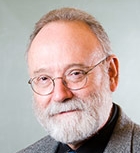Student Profiles
Neil Ramiller

Life beyond Reed
When I began my studies in the Reed MALS program, I was a chaired full professor in a business school at a large public university. (I have since retired.) I had long been bothered by hearing my Ph.D. referred to as a “terminal degree”—as if getting it marked the end of my education. I saw that Reed was seeking life-long learners who felt that their educations were unfinished business. Well, unless you’ve stopped asking questions and abandoned all curiosity about this life, whose education is ever finished? Neil graduated from the MALS program in May 2017 but continues his questioning by auditing courses. His thesis brought together his professional interests and Reed course work with a view into early modern science as an institutional project.
Academic interests
The MALS program presented the opportunity to broaden my intellectual horizons beyond the institutionalized channel of management research and teaching, with its narrow analytical and instrumental focus, and to explore historical foundations, to entertain alternative modes for expressing ideas and values, and to engage in critical, forward-looking thinking. I have taken classes in social and political history; the history of art, music, and science; classics; philosophy; anthropology; and literature. I should say that the classes were nominally in those categories, but each was truly interdisciplinary in nature, and there were many integrating themes across the courses.
Why MALS?
Looking back, I can readily say that the MALS program has been more demanding than my doctoral program was. Certainly not as a procedural ordeal—nothing much tops a Ph.D. program for hoops and hurdles—but instead where it counts, in challenges to synthesize ideas, marshal evidence, and undertake complex reasoning. Those challenges and the subsequent breakthroughs they inspired owe as much to conference discussions with outstanding faculty and classmates, as they do to the reading and writing I have done. I can’t recommend the MALS program strongly enough to anyone who wants greater insight into who we are now, how we became that way, and the larger possibilities, going forward, of being and becoming human.